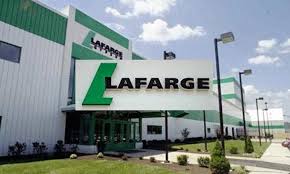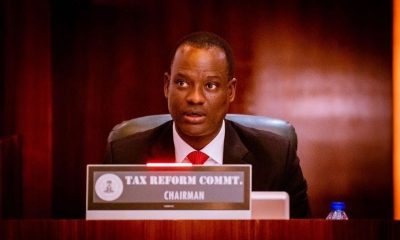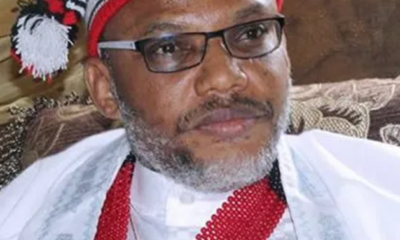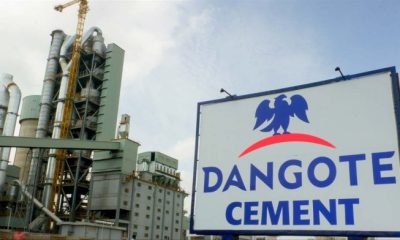Business
Senate panel summons Lafarge Africa over ‘planned divestment of shares to Chinese investors’

The senate committee on capital market has summoned the management of Lafarge Africa Plc over the planned divestment of 83.8 percent majority shares held by its parent company in the Nigerian cement industry.
The resolution was made on Wednesday by the committee during an interactive session with key regulators.
The committee had earlier engaged officials of the Securities and Exchange Commission (SEC), Bureau of Public Enterprises (BPE), and Federal Competition and Consumer Protection Commission (FCCPC) over reports of an alleged sale of Lafarge Africa to Chinese investors.
Abdulkafir Abbas, the director of securities and investment services at SEC, said the commission had not received any formal filing regarding the proposed sale.
Abbas said the SEC was informed of an internal restructuring by Holcim Group, the Swiss firm that holds 83.81 percent of Lafarge Africa’s issued share capital.
“Holcim Group holds 83.81 percent of Lafarge Africa Plc’s issued share capital through the following wholly owned entities,” Abbas said.
“As part of the internal restructuring, the 27.77 percent equity stake held by Associated International Cement Limited was transferred to another Holcim-owned entity, Davis Peak Holdings Limited. “There has been no change in the ultimate beneficial ownership of the shares as a result of this transaction.”
Speaking on behalf of the BPE, Satura Aisha Bello, director of post-transaction management, said the shares being divested belong to Lafarge and not to the 16.19 percent stake held by Nigerians.
Bello said Lafarge, which is listed on the Nigerian exchange, acquired 83 percent of the total shares of three federal government-owned cement companies during the privatisation exercises of 2001 and 2002.
She noted that the company has not tampered with the shares allocated to the Nigerian public.
Business
Nigerian stock market rebounds with N285bn gain

The Nigerian stock market rebounded on Friday, ending four straight sessions of losses with a N285 billion lift to investors’ portfolios.
Renewed interest in stocks such as Julius Berger, Learn Africa, Cornerstone Insurance, Aso Savings and Ikeja Hotel boosted sentiment.
The Nigerian Exchange market capitalisation, which opened at N97.543 trillion, rose by N285 billion or 0.29 per cent to close at N97.543 trillion.
Similarly, the All-Share Index increased by 0.29 per cent or 449.80 points to 154,126.46, up from 153,676.66 on Thursday.
Advertisement
Year-to-date return climbed to 49.74 per cent. Market breadth, however, closed negative, with 35 losers against 31 gainers.
Eterna, McNicholas and Deap Capital fell by 10 per cent each to close at N36, N2.97 and N1.71 per share.
Sunu Assurances shed 9.98 per cent to N4.51, while UPDC declined 9.93 per cent to N6.17 per share.
On the gainers’ side, Julius Berger and Learn Africa rose 10 per cent each to N151.80 and N6.49 per share.
Advertisement
Cornerstone Insurance gained 9.82 per cent to N6.15, Aso Savings advanced 9.57 per cent to N1.03 and Ikeja Hotel rose 8.36 per cent to N18.80.
Total trades amounted to 5.2 billion shares worth N45.2 billion across 30,598 deals.
Cornerstone Insurance topped activity with 4.68 billion shares valued at N22.13 billion.
Guaranty Trust Holding Company traded 66.4 million shares worth N5.9 billion, while Access Holdings moved 46.6 million shares valued at N1.11 billion.
Oando exchanged 32.1 million shares worth N1.6 billion, and Universal Insurance traded 27.5 million shares valued at N31.9 million.
Business
FAO warns 34.7m Nigerians risk food insecurity in 2026

The Food and Agriculture Organisation (FAO) has warned that about 34.7 million Nigerians, including Internally Displaced Persons (IDPs), could face acute food insecurity by June 2026 if urgent action is not taken.
The warning is contained in the October 2025 Cadre Harmonisé (CH) Food and Nutrition Insecurity Analysis, jointly released by the FAO and the Federal Ministry of Agriculture and Food Security (FMAFS).
The report, presented on Friday in Abuja, showed that about 650,730 persons in Borno, Sokoto and Zamfara States may experience crisis (CH Phase 3) or worse between June and August 2026.
It further revealed that about 27.2 million people, including IDPs, are already facing crisis or worse food insecurity levels across 27 states and the FCT.
The analysis stated that in Borno, six Local Government Areas are likely to experience an emergency, while food insecurity in Adamawa and Yobe States may deteriorate further.
It also noted that some households managed acceptable food consumption levels, but over 55 per cent did so by reducing meal quality or borrowing to purchase food.
Speaking at the event, Dr. Marcus Ogunbiyi, Permanent Secretary, Federal Ministry of Agriculture and Rural Development, reaffirmed the ministry’s commitment to strengthening resilience and promoting coordinated action on food security.
“Together, let us continue to strengthen frameworks that will support Nigerians towards achieving zero hunger and food sufficiency,” Ogunbiyi said.
Also speaking, the FAO Representative in Nigeria, Dr. Hussein Gadain, identified insecurity, insurgency, banditry, flooding, and climate-related challenges as major causes of food insecurity in the country.
He added that the high cost of agricultural inputs such as fertilisers, seeds and energy continued to threaten future production despite a recent decline in food prices.
Gadain called on partners in the Food Security Sector and Nutrition Cluster to intensify support for data collection and analysis in affected regions.
“This October cycle covered 27 states and the FCT, an increase from 26 in March. However, nine states remain outside the Cadre Harmonisé process,” he said.
He commended Ekiti State for independently joining and supporting data collection, calling it a strong example of state-level commitment to addressing food insecurity.
“Flooding and other climate events have devastated croplands, compounding risks for affected communities. The CH analysis remains our most relevant early warning tool,” Gadain added.
According to him, the analysis guides humanitarian programming, food security responses and development planning at national and sub-national levels.
Analysts recommended sustained humanitarian assistance, increased investment in climate-smart agriculture, promotion of agribusiness, and early integration of the Cadre Harmonisé analysis into policy and planning to address food security gaps.
The Cadre Harmonisé is a biannual, government-led assessment of food and nutrition insecurity in Nigeria. It is supported by the FAO, other United Nations agencies, and international and national NGOs.
It provides a unified framework for assessing current and projected food security situations and identifying vulnerable populations to inform evidence-based policymaking and guide timely interventions.
The initiative currently covers the 36 states of the federation and the FCT. (NAN)
Business
Alleged breach: Court strikes out FCCPC charge against MTN executives

The Federal High Court in Abuja on Thursday, struck out the criminal charge filed by the Federal Competition and Consumer Protection Commission (FCCPC) against MTN Nigeria Communications Plc and its top officials.
Justice Hauwa Yilwa struck out the suit, in a ruling, following an application for the withdrawal of the case by FCCPC’s lawyer, I. O. Aiaba.
Earlier upon resumed hearing on Thursday, Aiaba told the court that a notice of withdrawal was filed on Sept. 8.
The lawyer told the judge that the application was brought under Section 108 of the Administration of Criminal Justice Act (ACJA), 2015.
He said the prosecution adopted the notice and prayed that the court strike out the charge.
However, no lawyer appeared for the defendants and the defendants were also not in court for the trial.
Justice Yilwa consequently struck out the suit after the lawyer’s application.
MTN Nigeria; its Managing Director and Chief Executive Officer (MD/CEO), Mr Karl Toriola, and other co-defendants were being prosecuted by FCCPC over allegations bordering on breach of the commission’s Act.
FCCPC had sued the MTN Nigeria Communications Plc and Toriola as 1st and 2nd defendants.
The commission also named Tobechukwu Okigbo, MTN’s Chief Corporate Services and Sustainability Officer, and Ikenna Ikeme, General Manager, Regulatory Affairs of MTN as 3rd and 4th defendants respectively.
In the two-count charge, they were accused of failure to produce documents and information required by the commission in compliance with a lawful summons contrary to the FCCPC Act.
The charge, marked: FHC/ABJ/CR/354/2024, was dated July 19, 2024, and filed July 22, 2024 by a team of lawyers led by Akoji Achimugu.
It would be recalled that the FCCPC, through its lawyer, Nsitem Chizenum, had, in one of the settings, accused the MTN CEO and his co-defendants of evading service of court documents on them.
Chizenum had told the court, following the absence of the defendants in court.
He said several efforts made to effect the service of the processes on the defendants were unsuccessful
The lawyer also told the court that the Nigeria Police Force (NPF) had been involved and that their application was being processed by the NPF with a view to produce the defendants in court.
The matter was fixed for May 28 for the defendants to take their plea.
But when the matter was called, none of the defendants was in court.
In count one, the MTN Nigeria Communications PLC, Toriola, Okigbo and Ikeme were alleged to have on or about June 18, 2024 did without sufficient cause failed to produce documents and or information which they were required to produce, “in compliance with a lawful Summons and Request to Produce dated May 17, 2024.”
The commission alleged that the compliance with same summon was further extended by a letter dated June 5, 2024 and they thereby committed an offence contrary to and punishable under Section 33 (3) of the Federal Competition and Consumer Protection Act, 2018.
The offence, according to the prosecution, contravenes the provisions of Section 111 (1) of the FCCP Act, 2018, and punishable under Section 111 (2) of the same act.
-

 Business4 days ago
Business4 days agoFG unveils N10m excellence award for tax reform reporting
-

 News5 days ago
News5 days agoOkpebholo vows to sack incompetent contractors
-

 International4 days ago
International4 days agoUK passes new law on British citizenship
-

 News2 days ago
News2 days agoNnamdi Kanu files fresh motion, asks court to strike out all charges
-

 Education4 days ago
Education4 days agoUNILAG bans skitmaking, content creation on campus
-

 News4 days ago
News4 days agoSowore condemns US revocation of Soyinka’s visa
-

 Business3 days ago
Business3 days agoDangote Cement reports 165% surge in EPS, reinforces Market Leadership across Africa
-

 News5 days ago
News5 days agoLagos Court Jails Train Driver 18 Months for N6.9m Theft
-

 News4 days ago
News4 days ago11 Dead In Kenya Plane Crash —Airline
-

 News3 days ago
News3 days agoDSS arrest man pushing for Military coup on social media
-

 Politics4 days ago
Politics4 days agoAPC defends $1bn Lagos ports investment






